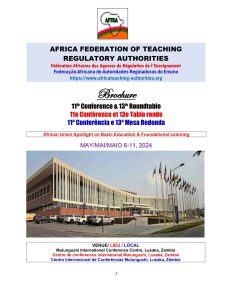
Second Spotlight Report on Africa shows the importance of coherent textbooks and teacher guides for foundational learning
- May 7, 2024
- Education
- 0 Comments
The second report in the Spotlight series in Africa, Learning Counts, focuses on foundational numeracy and shows that teachers will struggle to effectively translate the curriculum into action in the classroom without support to address their knowledge gaps and their adverse classroom conditions, for example through easy-to-use teacher guides.
Produced in partnership with the Association for Development of Education in Africa (ADEA), the report is being launched today, 7 May, at the 2024 Conference of the African Federation of Teaching Regulatory Authorities. Along with the continental report, the country report for Zambia will be launched at the same event, along with H.E Douglas Munsaka Syakalima, Minister of Education, Zambia. It is the first Spotlight session on foundational learning as part of the African Union Year of Education.
One in five children do not achieve minimum proficiency levels
Learning Counts compiles the latest out-of-school and completion rate statistics to show the challenge that countries face every day. For every 100 children in Africa, 18 children are out of school– twice the rate of the rest of the world. However, there is sign of improvement, with completion rates growing at a steady pace of almost one percentage point per year throughout the past 20 years. Still one in five children do not complete primary school today.
Albeit data gaps remain large, what evidence exists suggests that learning rates at the end of primary school have improved faster in Africa than the rest of the world since 2011. However, the challenge remains notable, with at most one in five children attaining minimum proficiency levels in reading and mathematics at the end of primary school today.
There is often a lack of connection between countries’ aspirations and their plans
For instance, having up to date and relevant textbooks is critical. Yet the report found that textbooks are often out-of-date and not available in the languages of instruction. Textbooks were not in the language of instruction for 80% of students in Zambia and in less than half of classrooms visited in Uganda. Given many students have limited reading skills, graphic explanations of mathematics concepts could help, but are often lacking.
Textbooks and teacher guides may not be fully aligned with the curriculum and their design needs to be reviewed to prevent confusion and improve implementation. In Mauritania, algebra is missing from the lower primary curriculum, while it is covered in textbooks and teacher guides. In Niger, textbooks and teacher guides include statistics and probability but the curriculum does not. Assessments often cover a different set of competencies from those outlined in the curriculum, particularly at the end of primary, where an examination culture prevails, and the level of cognitive difficulty increases.
Remedial education is highlighted as a critical approach for ensuring that all students are learning with understanding. Yet, of the five countries analysed only South Africa and Zambia contain guidance for teaching students who are falling behind. In Chad, a programme introduced in 2017/8 trained teachers to provide remedial support and they all implemented new strategies, such as rearranging classroom layouts and using more supportive approaches for struggling children, which ultimately saw children’s repetition rates fall.
Many countries need to contend with a teacher workforce whose qualifications and knowledge levels are well below what is required
Ongoing professional training is also important to improve teachers’ subject knowledge and refresh their qualifications, which the report shows technology is helping with in the case of Burkina Faso, the United Republic of Tanzania and Zambia among others. In Africa, 17% of countries require a bachelor’s degree to teach in comparison to 62% of countries globally, while teachers’ qualifications are also often lower than requirements.
The importance of training is highlighted in the report. Among surveyed primary school teachers in the 14 countries in the 2019 PASEC learning achievement survey, only 35% mastered basic procedures in mathematics. Differences in teacher subject knowledge accounts for more than one third of the cross-country variation in student achievement. But training approaches need to be sustainable and engaging teachers. Technology can help professional communities emerge, as a case study from Burkina Faso shows.
More funds are needed to bolster foundational learning
As explained in more detail in the special edition of the 2023 Education Finance Watch for Africa, education is dropping down the list of governments’ priorities despite there being an annual financing gap of USD 28 billion to achieve countries’ own targets to achieve 85% primary completion rate by 2030. External financing is meanwhile declining as a source of revenue for governments, and less likely to support foundational learning as to support secondary education. This makes it ever more important that it focuses on institutional building and not on short-term projects.
The report recommends the following:
At the individual level
1. Give all children a textbook – and all teachers a guide.
Ensure that all children and teachers have teaching and learning materials that are research-based, aligned with the curriculum, and locally developed. 2. Teach all children in their home language – and train teachers accordingly.
Give all children the opportunity to first learn to read in a language they understand and all teachers the confidence to support them.
3. Provide all children with a school meal.
Give all children the minimum conditions to learn at school.
At the system level
4. Make a clear plan to improve learning.
a. Develop a common continental framework to monitoring learning outcomes.
b. Establish clear learning standards and align assessments to evaluate how well students meet them.
c. Ensure learning is not abstract; children need full understanding before moving to advanced concepts.
5. Develop teacher capacity.
Ensure all teachers use classroom time effectively through cost-effective training.
6. Prepare instructional leaders.
Restructure support mechanisms offered to teachers and schools.
At the continental level
7. Learn from peers.
Reinvigorate mechanisms allowing countries to share experiences on foundational literacy and numeracy.
At the international level
8. Focus aid on institution building.
Shift from projects to provision of public goods that support foundational learning.
Download the report: https://bit.ly/2024-spotlight
Download social media cards and materials: https://trello.com/b/1CYw5ork/spotlight-report
The post Second Spotlight Report on Africa shows the importance of coherent textbooks and teacher guides for foundational learning appeared first on World Education Blog.
Africa – World Education Blog




